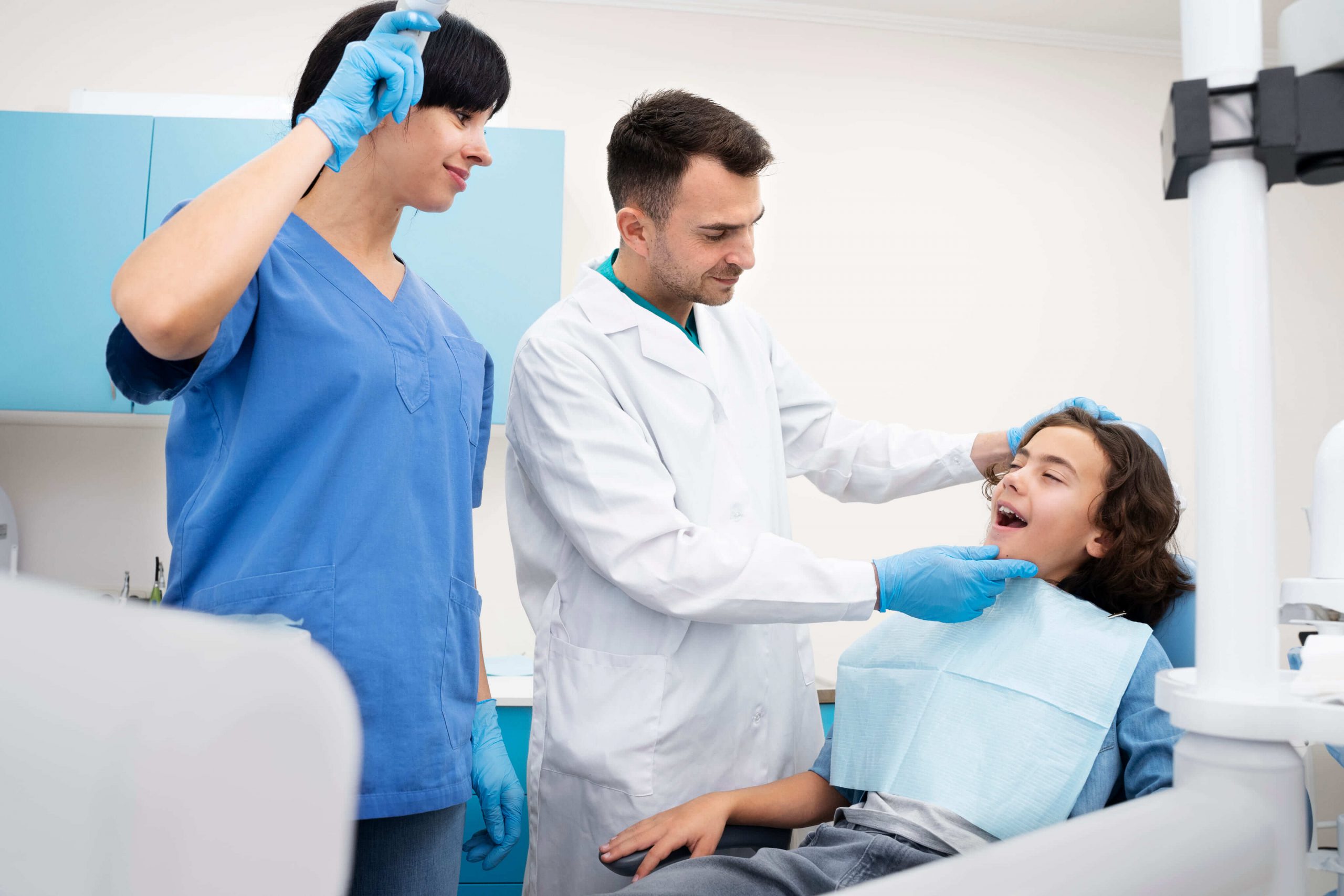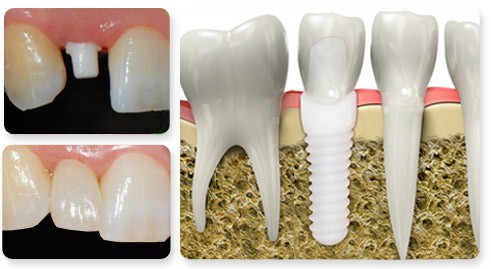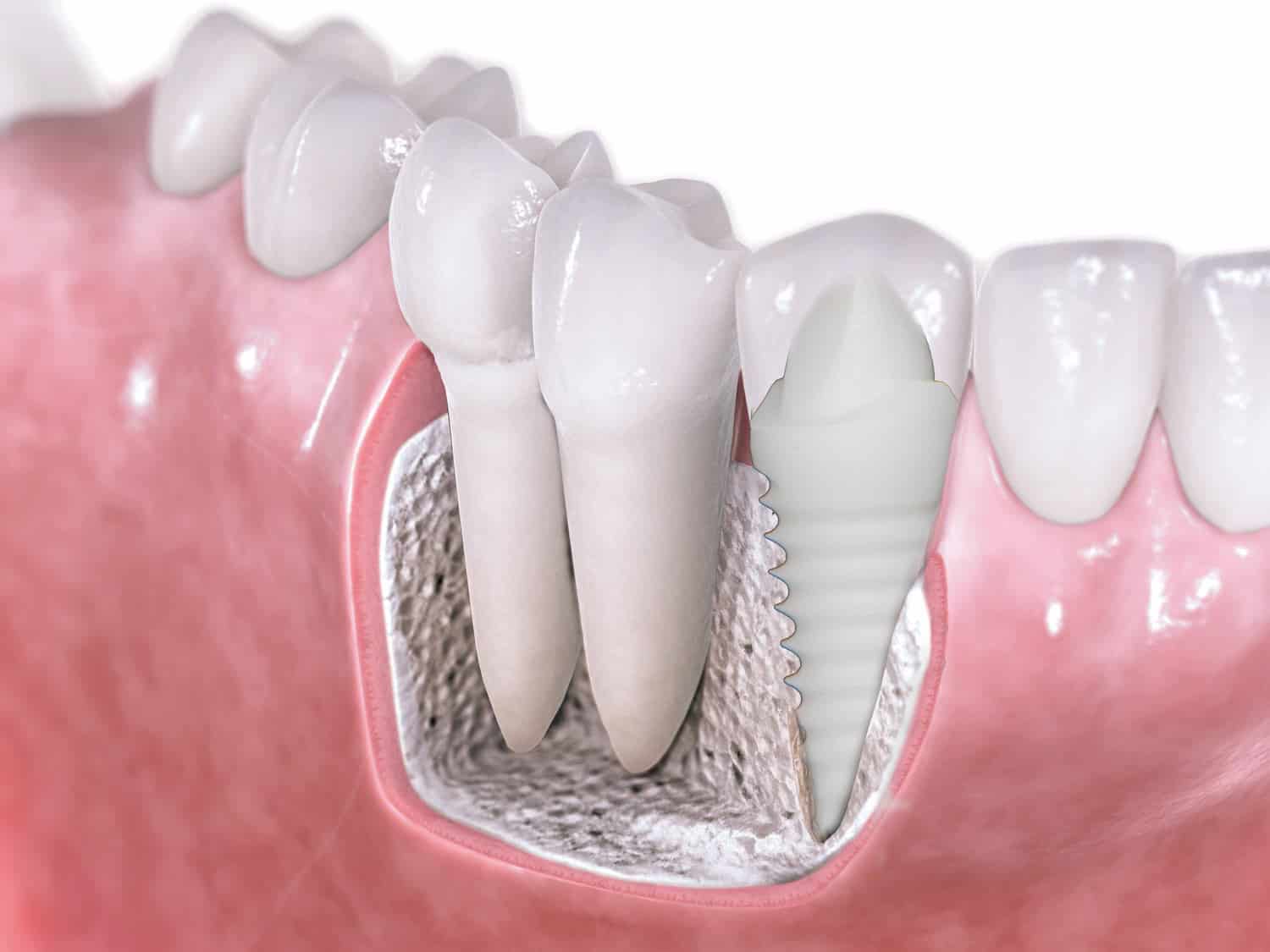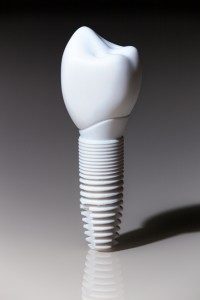
Is it normal to have pain after implant surgery?
It is not normal to have significant pain when getting implants? Pain after implant surgery should be minimal or non-existent. There may be minimal pain the day of getting an implant and the night after giving way to mild to moderate soreness after the first 2 days. The soreness should be able to be managed with Ibuprofen or Tylenol. Your implant doctor should have given you an antibiotic. It is very important that you start and finish the antibiotics as prescribed by your doctor.

ceramic implants
How long does it take for an implant to heal?
Most Implants will heal after 8-12 weeks. Once an implant heals the crown can be placed. Normally any pain or swelling from implant surgery will subside after 3-7 days. If you had multiple teeth removed and a full mouth of implants it may take an additional week for the swelling and soreness to go down. Is pain after dental implant surgery normal. It depends, but it should not hurt too much unless you have had other procedures in addition to implant surgery such as tooth removal and bone grafting.

zirconia ceramic tooth implant chevy chase 1
The factors affecting Implant healing
The exact amount of time it takes an implant to heal is related to the kind of implant, the health of the patient and the amount of gum and bone healing that needs to take place in the surgical area. For example if a molar tooth was removed and the implant doctor did a dental implant with same day bone and gum grafting, the healing period will likely be 12 weeks and not 8 weeks because there is more bone healing in a larger tooth removal site. On the other hand, if the tooth replacement dds, removed a single rooted front tooth and installed an implant the healing time may be closer to 8 weeks.
Pain management tips after implant procedures:
After an Implant procedure there can be swelling, inflammation, infection and possibly pain. Here are our general implant procedure post operative instructions:
- Start and finish the prescribed antibiotics. The mouth is a dirty place and places like bone are exposed to bacteria in the mouth. The antibiotics are necessary to get rid of any bacteria introduced during the implant procedure.
- Take an anti-inflammatory medication such as ibuprofen for 3-4 days to prevent swelling and pain. Ask your implant dentist, but taking ibuprofen or an anti-inflammatory before your implant procedure is a good idea to get ahead of swelling after implant oral surgery.
- Take a pain killer such as Vicodin only in the event of intolerable pain, but do not stop taking the antibiotics and anti-inflammatories. The biggest mistake made is to stop taking the anti-inflammatory medications and only take the pain killers. The Pain killers only kill pain, but as soon as they wear off, there is still tons of swelling and therefore pain.
- If you are experiencing any major pain after your implants, you should contact your implant specialist, because it is rare to have a lot of pain after implant surgery.
- Implant pain is rare, but it can be an early sign of implant failure and you may need to be evaluated by your implant dentist.
Extractions and bone grafting increases implant pain
Depending on what other procedures you may have had, there can be more symptoms. Holistic dentistry techniques such as ozone and prf for implants, reduces pain, swelling and healing time. Often times, dental implant surgery may be accompanied by tooth removal, bone grafting and gum grafting. Additionally if you had multiple implants and extractions performed your symptoms may be more severe. Other factors, may be the technique used by the implant dentist, the length of time your implant surgery lasted and your comfort level during the implant surgery. If you have tmj or teeth clenching issues, you may have more jaw pain especially at night. How do you stop clenching and grinding?
For example if you had a bone abscess caused by a root canal tooth your dentist may have removed the tooth, did some bone grafting and placed the implants. The implant dentist may or may not have had to do some incisions and stitches, etc. The more work done, the longer it takes, the more infection you needed to have repaired, the more swelling and pain. All these things factor into how much implant surgery hurts later. Generally, the more infection and pain before the procedure, the more pain after the procedure and the longer the recovery time after implants.

zirconia dental implant 200×300 1
Sedation can reduce pain after implant surgery
Your comfort level during the procedure matters too. Patients who are calm and comfortable and not nervous during the implant surgery, heal better and faster after the procedure. Often times it is better to receive some level of sedation for dental implants. There are different levels of sedation for implant surgery. We offer twilight implant sedation as well as full IV sedation for implant surgery. Is pain after dental implant surgery normal. Sometimes and it depends, but it should not hurt too much unless you have had other procedures in addition to implant surgery such as tooth removal and bone grafting.
Is it necessary to take antibiotics for implant procedures?
Yes, it is absolutely necessary to take antibiotics with a teeth implant surgeries. The mouth is a dirty place and it cannot be isolated and sterile like an operating room. Invariably bacteria are going to get into a dental oral surgery site. When teeth are removed, implants installed, gum grafting, bone grafting done, no question there is going to be contamination into the jawbone by oral bacteria. Even in a clean healthy mouth, good bacteria in the wrong place can spell trouble. The fastest way to have a tooth implant fail is to not take the antibiotics after dental surgery. Also, pain a swelling can be much worse and who wants to be in pain for weeks after implant surgery and possibly need to deal with additional surgeries in the event of a failure.
How to reduce pain after getting implants
- Take lots of Vitamin C for a week leading up to the procedure
- Drink lots of water before and after the procedure
- Take Arnica (natural anti inflammatory) prior to the implant procedure
- Take Ibuprofen along with Arnica after surgery
- Take the most mild antibiotic possible such as Penicillin VK or Amoxicillin. Ask you doctor about any prescription drugs and keep them in the loop about all our supplements and medications.

 (301) 421 1996
(301) 421 1996 burtonsvillesmiles@gmail.com
burtonsvillesmiles@gmail.com